- Home
- Henry David Thoreau
The Essays of Henry D. Thoreau Page 6
The Essays of Henry D. Thoreau Read online
Page 6
VII. THE NICK OF TIME
I myself part company with Thoreau when he gets to John Brown. Except for the clarity of Brown’s stand against slavery, and for his ability to form friendships in the black community, I find little to recommend him. I don’t like the willful violence. I don’t like the refusal of organized politics and collective action. I am put off by what a friend of his called “his God idea,” especially when joined to his “imperial egotism.”
And because Thoreau seems not to feel, or at least never expresses, any such reservations, I find that I hear a number of things differently when I turn back to the earlier essays with the Brown case echoing in my ears. When first describing the prophetic voice, I mentioned in passing that it has its dangers, and the difference I now speak of is probably best described as another version of that point. I pause more now when Thoreau proclaims his love of heroes. I am cautious before his grandiosity, his mythmaking, his manliness. His solitude and his refusals still stir me, but I am more aware of the political registers that they exclude. Moreover, as one born in a century that brought both the horrors of ethnic cleansing and the insights of psychoanalysis, I can no longer hear Thoreau’s longing for “purity” without hearing as well an undertone of potential cruelty, the threat, that is, to whatever the purist hopes to purge, be it (in Thoreau’s case) the appetites of his own body and the imperfections of his friends or (in Brown’s case) the sins of unwitting children and the imperfections of “this guilty land.” (Perhaps it is exactly this—the potential cruelty of good conscience—that led Gandhi and King to insist on nonviolent action, a tactic that is latent in the early Thoreau but then abandoned, not developed.)
It often turns out, once we get some specific cases before us, to be difficult to translate prophetic idealism into actual practice. At the close of the first section of this essay, I made it sound simple: “You resist an immoral war and go to jail.” You quit, you hunker down, you go back, you leave: it seems so easy when put so briefly. And I meant it to seem easy: Thoreau is a master at calling out our optimism, and I was there happily joining my voice to his in hopes of casting the old spell. In that can-do mode, one might similarly have said, in 1859, “You see the wrong of slavery, attack the slaveholder, and put an end to it.” But at this distance in time at least, the turmoil and carnage that followed John Brown should make us pause to reflect on the territory between seeing the wrong and putting it right.
Not all slaveholding societies, after all, resorted to violence to bring an end to slavery. None, I think, had to suffer the kind of civil war we had to suffer. The British, for example, slowly ended slavery in the West Indies by converting slaves into “apprentice laborers” who had to give a good portion of their income to their masters for four years before becoming fully free. The British also reimbursed West Indian planters for the capital they had invested in slaves; the government essentially bought the slaves to free them. They spent twenty million pounds to do so, a significant sum of money in 1834, the year of West Indian emancipation.
Similarly, in the United States several Northern states ended slavery by slow and compromising measures. In 1804 New Jersey passed an act for gradual abolition. As of July 4 of that year, the children of slaves were born free, though they had to remain servants of their mother’s owner until they came of age. In 1846 the state abolished slavery entirely, though again by a gradualist formula: the children of slaves were now wholly free at birth, but slaves themselves were converted to “apprentices” whose condition combined continued involuntary servitude with legal rights that slaves had never had before. In 1850 there were 236 such apprentices in New Jersey; in 1860 there were 2.
Such pragmatic and middling solutions would be unthinkable to all-or-nothing men like Thoreau and Brown. For one thing, they require accepting that there might be such a thing as property in persons (the British, that is, could not buy West Indian slaves without recognizing slavery as a legal fact). Gradualist solutions require dealing with the devil and staining the conscience, and purity of conscience is Thoreau’s point of departure, the ground on which he stands. But, the pragmatist might ask, what exactly is the alternative? Refusing to work with slavery as it in fact existed meant inviting a conflict that only war could settle, and war surely is the devil’s playground. Might not a man also stain his conscience by insisting that its price can only be reckoned in the currency of Union dead? Emerson once called John Brown “a pure idealist” and, noting that Brown believed above all in the Golden Rule and the Declaration of Independence, recalled that he had once said, in regard to these: “Better that a whole generation of men, women and children should pass away by a violent death, than that one word of either should be violated in this country.” As others have pointed out, there is a grim confusion here between figurative eloquence and literal statement. A whole generation? By violent death? Really?
Ah, but Emerson did not speak of Brown on some infinitely recurring November evening. He spoke on November 18, 1859. John Brown was two weeks away from the scaffold, and the failed fight against the Fugitive Slave Law was a decade old. Northerners had found all the avenues of compromise to be dead ends. There is an earlier, more pragmatic Emerson (who in 1844 offered the British in the West Indies as a model for how America might abolish slavery), as there is an earlier Thoreau whose image of disobedience was more “civil.” Which is to say that there is no point reading the late political essays the way I read “Walking.” The prophetic voice, as I said, erases history, and we are emphatically in history now.
That “prophetic excursion” I outlined earlier ends with the prophet falling silent, leaving the rest of us to figure out how best to turn vision into fact. In the 1850s we have Thoreau embarking on that last phase, letting himself be drawn into the most temporal of matters and, with John Brown, attaching himself to an actor and an action. It is a shift that requires Thoreau to forget his ignorance, of course, for remembering ignorance, and cultivating it in a spirit of fertile regret, are conditions of refusal and retreat, not of consent and public engagement. The late political essays are the fruit of a prophetic temperament, but they themselves are not prophetic; they are time-bound, and they need to be read, first of all, with as much sense of the historical moment as possible.
Thus, though it is the case that I do not follow Thoreau in his praise for John Brown, it also feels quite churlish to be recalling gradualist solutions to slavery at this late date. The more I try to imagine what it was like to live in Concord in the fall of 1859, the more I know that my reservations are born and bred in a luxury of time. I not only have a century-and-a-half distance from the events that gripped Thoreau; I know more than he did about Brown, and I know about the Civil War. With such a large remove in time it is not hard to be dispassionate about strategy, and not hard to find the fault in every action. But these are the privileges of the noncombatant, and few who take their own times seriously can have them.
At the close of Walden, Thoreau suggests how varied might be the pitches of his voice, saying that the poems of Kabir were supposed to have four different senses—illusory, spiritual, intellectual, and esoteric—and complaining of readers who hope to settle on a single one of these. In speaking of Kabir, he may have been teasing Christian readers more familiar with the medieval system by which the Bible was read at four levels—the literal, the allegorical, the moral, and the anagogical. The terms are not the point, however; the point is that much of Thoreau’s art lies in his ability to move (gracefully, annoyingly) among the several kinds of sense. If you think Walden’s story about the bean field is there as a practical lesson, you are wrong: he means it as a parable. But if you think it’s a parable, you are wrong: it’s the literal truth; he really did plant those beans.
I have been coming back to Thoreau’s essays regularly for more than thirty years, and something different happens each time I pick them up. I cannot now read him without marking the history in his words, the degree to which the ideals he calls us toward belong to the common rhetori
c of the mid-nineteenth century and to his own lived life. But cleaving to a historical reading of Thoreau does not account for his persistence and appeal. For that we need to open our ears to other levels of meaning. We must allow his erasures of chronology if we are to sense how, yes, a snowstorm in Concord is like the snowstorm in Book XII of The Iliad. We must allow his attack on Understanding if we ever hope to feel how large our ignorance is. We must take seriously his claim that the divine was at work in John Brown if we are to feel how pitched the forces were that fed the Civil War. These essays are now five or six generations behind us, but that does not mean they cannot come quickly back to life for any reader with ears to hear the many registers of their author’s voice.
NATURAL HISTORY OF MASSACHUSETTS
The Dial, July 1842. The preliminary note is by Ralph Waldo Emerson.
NATURAL HISTORY. OF MASSACHUSETTS3
Books of natural history make the most cheerful winter reading. I read in Audubon with a thrill of delight, when the snow covers the ground, of the magnolia, and the Florida keys, and their warm sea-breezes; of the fence-rail, and the cotton-tree, and the migrations of the rice-bird; of the breaking up of winter in Labrador, and the melting of the snow on the forks of the Missouri; and owe an accession of health to these reminiscences of luxuriant nature.
Within the circuit of this plodding life,
There enter moments of an azure hue,
Untarnished fair as is the violet
Or anemone, when the spring strews them
By some meandering rivulet, which make
The best philosophy untrue that aims
But to console man for his grievances.
I have remembered, when the winter came,
High in my chamber in the frosty nights,
When in the still light of the cheerful moon,
On every twig and rail and jutting spout,
The icy spears were adding to their length
Against the arrows of the coming sun,
How in the shimmering noon of summer past
Some unrecorded beam slanted across
The upland pastures where the Johnswort grew;
Or heard, amid the verdure of my mind,
The bee’s long smothered hum, on the blue flag
Loitering amidst the mead; or busy rill,
Which now through all its course stands still and dumb,
Its own memorial,—purling at its play
Along the slopes, and through the meadows next,
Until its youthful sound was hushed at last
In the staid current of the lowland stream;
Or seen the furrows shine but late upturned,
And where the fieldfare followed in the rear,
When all the fields around lay bound and hoar
Beneath a thick integument of snow.
So by God’s cheap economy made rich
To go upon my winter’s task again.
I am singularly refreshed in winter when I hear of service-berries, poke-weed, juniper. Is not heaven made up of these cheap summer glories? There is a singular health in those words, Labrador and East Main, which no desponding creed recognizes. How much more than Federal are these States! If there were no other vicissitudes than the seasons, our interest would never tire. Much more is adoing than Congress wots of. What journal do the persimmon and the buckeye keep, and the sharp-shinned hawk? What is transpiring from summer to winter in the Carolinas, and the Great Pine Forest, and the Valley of the Mohawk? The merely political aspect of the land is never very cheering; men are degraded when considered as the members of a political organization. On this side all lands present only the symptoms of decay. I see but Bunker Hill and Sing-Sing, the District of Columbia and Sullivan’s Island, with a few avenues connecting them. But paltry are they all beside one blast of the cast or the south wind which blows over them.
In society you will not find health, but in nature. Unless our feet at least stood in the midst of nature, all our faces would be pale and livid. Society is always diseased, and the best is the most so. There is no scent in it so wholesome as that of the pines, nor any fragrance so penetrating and restorative as the life-everlasting in high pastures. I would keep some book of natural history always by me as a sort of elixir, the reading of which should restore the tone of the system. To the sick, indeed, nature is sick, but to the well, a fountain of health. To him who contemplates a trait of natural beauty no harm nor disappointment can come. The doctrines of despair, of spiritual or political tyranny or servitude, were never taught by such as shared the serenity of nature. Surely good courage will not flag here on the Atlantic border, as long as we are flanked by the Fur Countries. There is enough in that sound to cheer one under any circumstances. The spruce, the hemlock, and the pine will not countenance despair. Methinks some creeds in vestries and churches do forget the hunter wrapped in furs by the Great Slave Lake, and that the Esquimaux sledges are drawn by dogs, and in the twilight of the northern night the hunter does not give over to follow the seal and walrus on the ice. They are of sick and diseased imaginations who would toll the world’s knell so soon. Cannot these sedentary sects do better than prepare the shrouds and write the epitaphs of those other busy living men? The practical faith of all men belies the preacher’s consolation. What is any man’s discourse to me, if I am not sensible of something in it as steady and cheery as the creak of crickets? In it the woods must be relieved against the sky. Men tire me when I am not constantly greeted and refreshed as by the flux of sparkling streams. Surely joy is the condition of life. Think of the young fry that leap in ponds, the myriads of insects ushered into being on a summer evening, the incessant note of the hyla with which the woods ring in the spring, the nonchalance of the butterfly carrying accident and change painted in a thousand hues upon its wings, or the brook minnow stoutly stemming the current, the lustre of whose scales, worn bright by the attrition, is reflected upon the bank!
We fancy that this din of religion, literature, and philosophy, which is heard in pulpits, lyceums, and parlors, vibrates through the universe, and is as catholic a sound as the creaking of the earth’s axle; but if a man sleep soundly, he will forget it all between sunset and dawn. It is the three-inch swing of a pendulum in a cupboard, which the great pulse of nature vibrates by and through each instant. When we lift our eyelids and open our ears, it disappears with smoke and rattle like the cars on a railroad. When I detect a beauty in any of the recesses of nature, I am reminded, by the serene and retired spirit in which it requires to be contemplated, of the inexpressible privacy of a life,—how silent and unambitious it is. The beauty there is in mosses must be considered from the holiest, quietest nook. What an admirable training is science for the more active warfare of life! Indeed, the unchallenged bravery which these studies imply, is far more impressive than the trumpeted valor of the warrior. I am pleased to learn that Thales was up and stirring by night not unfrequently, as his astronomical discoveries prove. Linnæus, setting out for Lapland, surveys his “comb” and “spare shirt,” “leathern breeches” and “gauze cap to keep off gnats,” with as much complacency as Bonaparte a park of artillery for the Russian campaign. The quiet bravery of the man is admirable. His eye is to take in fish, flower, and bird, quadruped and biped. Science is always brave; for to know is to know good; doubt and danger quail before her eye. What the coward overlooks in his hurry, she calmly scrutinizes, breaking ground like a pioneer for the array of arts that follow in her train. But cowardice is unscientific; for there cannot be a science of ignorance. There may be a science of bravery, for that advances; but a retreat is rarely well conducted; if it is, then is it an orderly advance in the face of circumstances.
But to draw a little nearer to our promised topics. Entomology extends the limits of being in a new direction, so that I walk in nature with a sense of greater space and freedom. It suggests besides, that the universe is not rough-hewn, but perfect in its details. Nature will bear the closest inspection; she invites us to lay our eye level
with the smallest leaf, and take an insect view of its plain. She has no interstices; every part is full of life. I explore, too, with pleasure, the sources of the myriad sounds which crowd the summer noon, and which seem the very grain and stuff of which eternity is made. Who does not remember the shrill roll-call of the harvest-fly? There were ears for these sounds in Greece long ago, as Anacreon’s ode will show.
“We pronounce thee happy, Cicada,
For on the tops of the trees,
Drinking a little dew,
Like any king thou singest,
For thine are they all,
Whatever thou seest in the fields,
And whatever the woods bear.
Thou art the friend of the husbandmen.
In no respect injuring any one;
And thou art honored among men,
Sweet prophet of summer.
The Muses love thee,
And Phœbus himself loves thee,
And has given thee a shrill song;
Age does not wrack thee,
Thou skillful, earthborn, song-loving,
Unsuffering, bloodless one;
Almost thou art like the gods.”
In the autumn days, the creaking of crickets is heard at noon over all the land, and as in summer they are heard chiefly at nightfall, so then by their incessant chirp they usher in the evening of the year. Nor can all the vanities that vex the world alter one whit the measure that night has chosen. Every pulse-beat is in exact time with the cricket’s chant and the tickings of the death-watch in the wall. Alternate with these if you can.

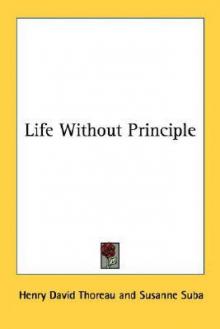 Life Without Principle
Life Without Principle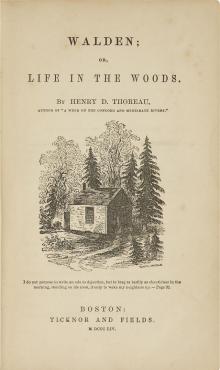 Walden
Walden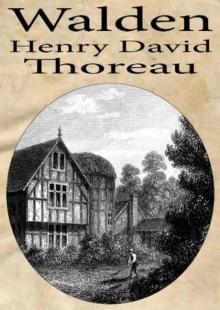 Walden by Henry David Thoreau
Walden by Henry David Thoreau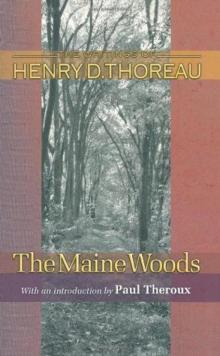 The Maine Woods (Writings of Henry D. Thoreau)
The Maine Woods (Writings of Henry D. Thoreau)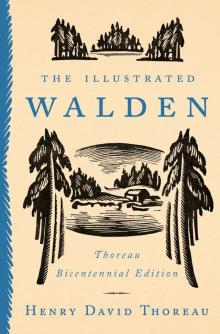 The Illustrated Walden
The Illustrated Walden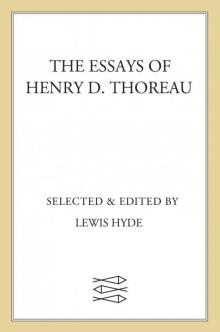 The Essays of Henry D. Thoreau
The Essays of Henry D. Thoreau